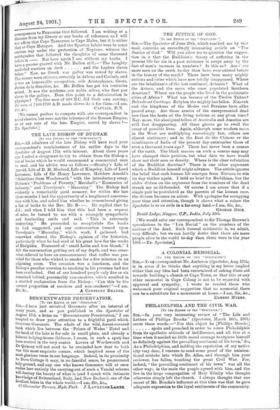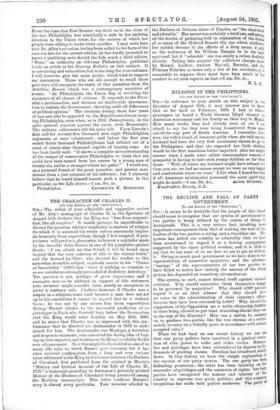PHILADELPHIA AND THE CIVIL WAR. [To THE EDITOR OP THE
"SPECTATOR.'1 SIR,—In your very interesting review of " The Life and Letters of Phillips Brooks " (Spectator, March 16th, 1901) occur these words :—" For this object he [Phillips Brooks] spoke and preached in order to rouse Philadelphia from its apathetic attitude of indifference, and all this at a time when it needed no little moral courage to express himself so definitely against the prevailing sentiment of his town," &c. As a Philadelphian, and holding the reputation of my native city very dear, I venture to send some proof of the uninten- tional mistake into which Dr. Allen, and through him your reviewer, has fallen, touching the great Civil War. For, indeed, " the prevailing sentiment of his town" was all, the other way ; in the main the people agreed with him, and the few in the large congregation of Holy Trinity who thought otherwise simply left the church. I always thought that one secret of Mr. Brooks's influence at this time was that he give adequate expression to the loyal sentiments of the community. From the time that Fort Sumter was fired on to the close of the war, Philadelphia was practically a unit in her untiring devotion to the Union cause, for the success of which her people were willing to make every sacrifice. I may state here that Dr. Allen's attention having been called to the facts of the case too late for the second edition, he has kindly promised to insert a qualifying note should the Life reach a third edition. "Penn, an authority on old-time Philadelphia, published lately an article in the Evening Bulletin on this subject, It is convincing and exhaustive, but is too long for your columns. I will, however, give the main points, which tend to support my contention. Those who are old enough to recall those past days will recognise the truth of this quotation from the Rebellion Record, which was a contemporary narrative of events. "At Philadelphia the Union flag is receiving the signature of all classes of citizens. It responds to the Presi- dent's proclamation, and declares an unalterable determina- tion to stuitain the Government, throwing aside all differences of political opinion." The elections during those four years of war can also be appealed to, the Republicans always carry- ing Philadelphia, even when, as in 1862, Pennsylvania, in the quite general reaction against the party, went Democratic. The military enlistments tell the same tale. Upon Lincoln's first cal/ for seventy-five thousand men eight Philadelphian regiments at once volunteered ; and before the first year ended thirty thousand Philadelphians had enlisted out of a total of ninety-nine thousand capable of bearing arms. As has been justly said : "It shows a complete misunderstanding of the temper of conservative Philadelphia to think that she could have been turned from her course by a young man of twenty-six, and he a stranger within her gates 9." I would not, as a, personal friend of the great preacher, and greater man, detract from a just estimate of his influence ; but I sincerely believe that he would himself lament such a picture, in this particular, as the Life draws.—I am, Sir, &c., Philadelphia. CATHERINE K. MEREDITH.



































 Previous page
Previous page